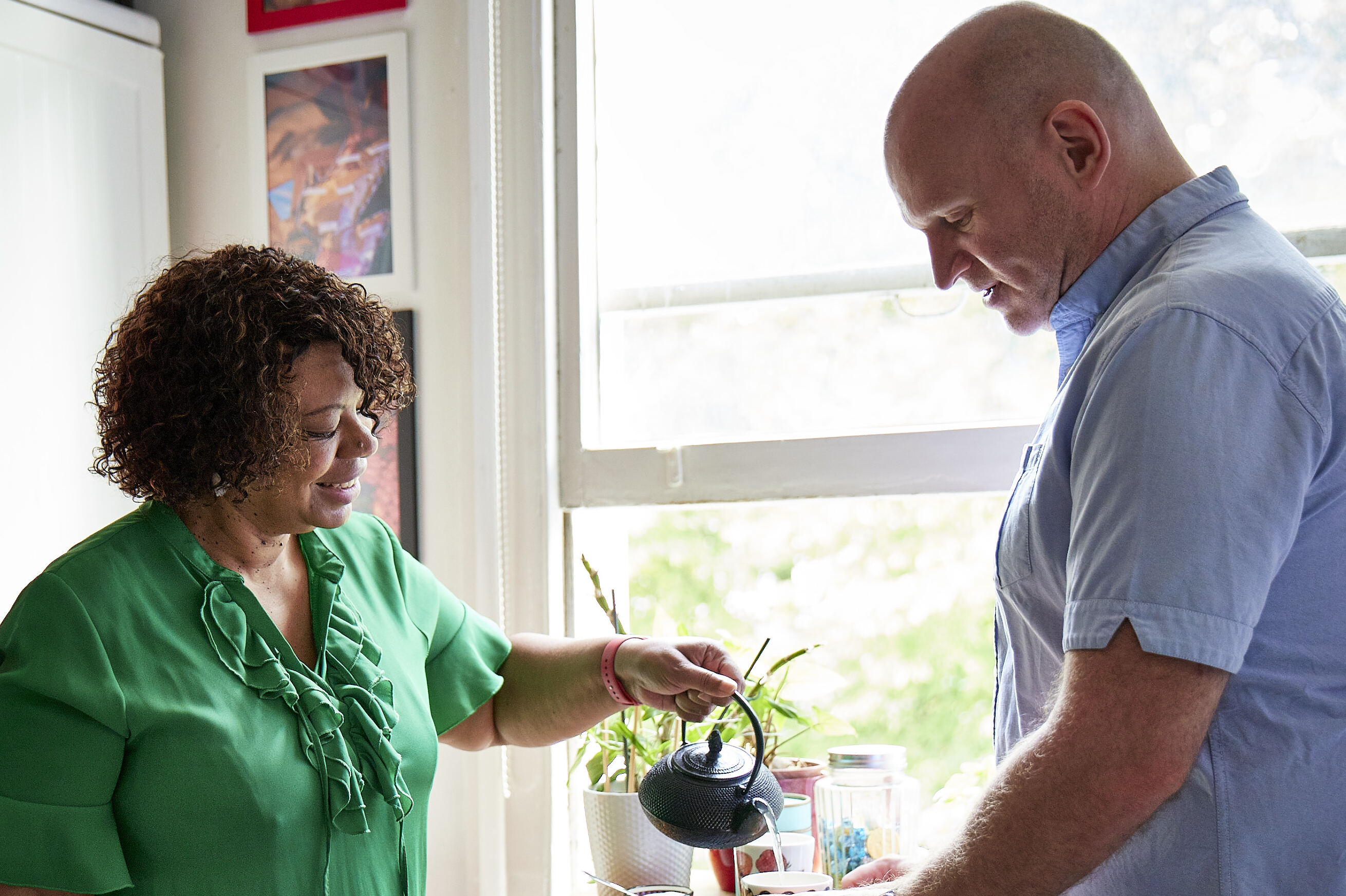
Spirituality and cancer
What is spirituality?
Spirituality can mean different things to different people, often representing a sense of connection to something beyond ourselves. While some people express their spirituality through religion, for others, spirituality exists independently of religious belief.
Spirituality can be expressed in various ways, such as through music or poetry. People may find comfort in prayer, meditation or rituals from different cultures.
Individuals may also seek spiritual support in diverse forms, whether it’s the comfort of friends and family, a caring community, or wisdom from religious leaders.

How spirituality is part of your care
What matters to you is important to your physical health and mental wellbeing. This includes your spirituality.
Spiritual needs can be anything that helps connect you to your spirituality. Some examples are:
- access to religious services or to spiritual practices
- spending time with the people that are important to you
- following religious customs
- access to further support such as support groups or talking therapies
- time for meditation, prayer or a quiet space to sit with your thoughts or feelings
- access to chaplaincy services, or religious or faith leaders.
-
Personalised care
The NHS Long Term Plan aims to give people living with cancer access to personalised care.
Personalised care means you take an active role in the way your care is planned and delivered. It is based on what matters to you, and your individual strengths and needs.
Your spirituality is an important part of personalised care. This is because your spirituality can be connected to your overall wellbeing.
Your healthcare team may talk to you about your spiritual beliefs when planning your treatment and care. This is so they can better understand your spiritual needs.
They may be able to signpost you to where you can get support. This could be local support groups, the hospital's chaplaincy services or other community services.
-
Palliative and end of life care
Palliative care means the care and support you might need if you have a life-limiting illness, such as cancer. It is often called supportive care.
End of life care is a form of palliative care you receive when you are close to the end of life.
Your spiritual needs may change or become more important to you when facing a terminal illness.
When planning your palliative care your healthcare team may ask about your spiritual needs. This is so they can understand what your wishes are when it comes to your treatment and future care.
Your team may help to support your spiritual needs by:
- arranging for you to attend religious services
- helping you make funeral plans
- arranging for you to see a faith leader or chaplain (you do not need to follow a particular religion or faith to speak to them)
- writing down how you wish to be cared for as part of your advance care plan
- signposting to further support for you and those that care for you.
Some people who are having palliative or end of life care may feel closer to their faith, religion or spirituality for support. Others may draw away. Some people may also experience different emotions like anger, guilt or a crisis of faith.
If you are struggling or feeling disconnected from your beliefs, spiritual care services or consellors can help you explore your thoughts and emotions without judgement.
Talking about spirituality
A cancer diagnosis can lead many people to think about their faith, religion or spirituality.
You may have questions, feel new emotions, and your personal values, beliefs and views may change. You may withdraw or grow closer to faith, religion or a spiritual support system.
There may be different times during your cancer journey where you may want to talk about your spirituality. This could be with your healthcare team to decide on what type of care or treatment you would like. It could also be with people with similar experiences or spiritual needs in a support group.
Talking to your healthcare team
Your healthcare team may talk to you about your spiritual needs as part of your care.
However, even if your healthcare team does not begin the conversation, you can still talk to your team about your spiritual needs.
It may be helpful to have someone with you when you talk to your healthcare team. You may also find it useful to write down your thoughts or questions before your appointment to help you discuss your spiritual needs.
Your healthcare team is there to support you and listen to what matters.
Holistic Needs Assessment (HNA)
As part of your cancer care, you may have a Holistic Needs Assessment. This is a discussion you have with someone from your healthcare team.
You will fill out an assessment or answer some questions. Then the healthcare professional will talk through your needs and concerns. You both then agree on a plan for your care and support needs.
It's called holistic because you can discuss any area of your life that has been affected by cancer such as your spirituality.
For example, you may want to speak to your healthcare team if it is important to you to pray or have quiet time for reflection before treatment. By discussing this with your healthcare team, they may be able to accommodate this request for you.
HNAs may be offered in hospitals or GP practices. Or it can sometimes be done over the phone or online in a video call (virtually). If you have not been offered an HNA and would like one, you can ask someone from your healthcare team or your GP about it.
Chaplaincy, pastoral and spiritual care services
Many NHS Trusts offer services to meet their patients' spiritual needs. These can be called different names depending on the location such as:
- chaplaincy service
- pastoral care
- spiritual support.
These services will be run by specialists that are sometimes called chaplains. They offer pastoral, spiritual and religious wellbeing for patients and their families and carers.
You can speak to a chaplain or anyone from the spiritual needs service regardless of whether you have faith or not. They can offer a listening ear and give the appropriate support for you.
If you are in a hospital or hospice, you can request to see a member of the spiritual care service.
There may also be a hospital prayer room or chapel that you can use. This is sometimes called a quiet space. You can use this for personal prayer, meditation or as a quiet space to explore your thoughts and feelings.
Local support
If you have spoken to your healthcare team about your spiritual needs, they may be able to signpost you to support in your community.
This could include:
- local support groups
- religious or faith organisations
- complementary services like meditation, reflexology and reiki
- other services that help you connect to others like yoga classes, walking groups and more.
You can also find local support groups and more by using our postcode search.
If you are part of a faith or religion, where you practice this may have support groups and services available to you.
Talking to those close to you
It may be helpful to talk to those close to you about your spirituality and spiritual needs. This could be a family member, friend, carer or a religious or faith leader.
There may be times when you do not feel like talking. You may just want to sit quietly together.
Sometimes other people's spirituality, faith or religion may make it difficult to talk about how you are feeling. You can talk to a healthcare professional who may be able to offer you advice and support in this situation. Or you could ask someone from your spirituality, faith or religion to be there to support you.
If someone's words about spirituality or faith don't feel helpful to you, it's ok to set boundaries or seek support from those who you feel comfortable with.
We have more information talking about cancer to help you think who you want to know about your diagnosis and how to talk to them.
If you are caring for someone
If you are caring for someone with cancer may also you may also have questions about your faith, religion or spiritual beliefs. Your local chaplaincy, pastoral or spiritual care services can support you. They may host support groups to explore your spiritual needs and offer a listening ear.
Online Community
The Online Community is a place to chat to others who know what you or your loved one are going through. You can anonymously share your feelings and experiences and find support from others who understand what you're going through. You'll find dedicated forums such as the religion, spirituality and prayer group forum.

Where you can get support
It's important that the support you receive reflects your needs and values. There's many ways you can access support.
- Speak to your GP or Healthcare team.
- Find cancer support services in your area, enter your postcode to locate practical help and support groups near to where you live.
- Contact the Macmillan Support Line. Our trained advisors offer emotional support and practical information to people affected by cancer. Call 0808 808 00 00 or use our online chat. 7 days a week, 8am to 8pm.
- The Online Community is a place to chat to others who know what you or your loved one are going through. You'll find dedicated forums such as the Religion, Spirituality and Prayer forum as well as blogs from community members. Read the Spirituality, faith and cancer in the Online Community blog.
Your stories
Peju's story
In the video below, Peju discusses her experience of cancer and her faith. We have more information about the Digital Storytelling Project and how it has supported people to share their stories and what matters to them.
Kreena's story
In 2013, Kreena was diagnosed with stage 3 breast cancer. Three years after finishing treatment, the effects of the chemotherapy led her to being diagnosed with acute heart failure.
“Despite the fading hopes of the healthcare professionals, I felt a light, a calling. Something was telling me that I would make it through, this would not be where my journey ended.
“In fact, it was quite the opposite, this was where life would begin. It was here that my journey with spirituality really began. Here that I started to really work on my mental health and wellbeing.
“Life is not linear, the more diversions you meet, the more sights you get to take in. The more you grow, the more you learn. I am eternally grateful for my journey on the bumpy winding road because that journey is what brought me here, to this space I call home.”
About our information
This information has been written and edited by Macmillan's Digital Content team. It has been reviewed by Macmillan staff from different religious and spiritual backgrounds, and Dr Fatima Javed, Cancer Support Services Project Manager at the Green Lane Masjid, and Macmillan's Cancer Information Development team.
Learn more about how we produce our information and about our Digital Content Editors.
Read more
-
Blogs 21 Feb 2025We hope this information can help answer some questions if you, or someone you know, is having treatment for cancer during Ramadan.
-
Blogs 02 Jun 2025Learn more about Safeena, a Muslim-focused cancer support organisation founded in 2023. They are helping to provide culturally sensitive and faith-informed support for people affected by cancer.
-
Blogs 01 Aug 2024Here you will find practical advice and emotional support as you adjust to life after cancer treatment. We have information about returning to work, managing your emotions, dealing with side effects...





